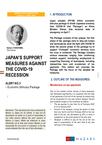
ALERT NO.3 – Economic Stimulus Package
1. INTRODUCTION
Japan adopted JPY108 trillion economic stimulus package to shield Japanese economy from COVID-19 (the “Package”) as Prime Minister Shinzo Abe declared state of emergency on April 7.
The Package consists of two phases: the first phase of the package aims to stop job losses and bankruptcies amid the fight with COVID-19 while the second phase of the package try to support “V-shaped” economic recovery once the virus is contained. The Package includes various measures ranging from reinforcing medical support, maintaining employment to supporting financing of businesses, including interest-free loan and moratorium of tax payments. This edition will overview the Package with the focus on the adopted tax measures.
2. OUTLINE OF TAX MEASURES
Moratorium on tax payments
Due to the situation where income of many taxpayers has decreased significantly, it is proposed that due date of tax payments of all kind of tax (except for stamp duty) will be suspended for one year without delayed interest and collateral subject to the conditions as follows:
- The tax payment is due from 1st of February 2020 to 31 of January 2021.
- Income of the taxpayer, during the period of more than one month and from February 2020 to the due date of the tax, has decreased by 20% or more in comparison to the same period of the prior year.
- Taxpayer is difficult to pay all the tax at the due date in consideration of the cash flow of the next half year of the taxpayer.
Tax loss carry back
Carry back of tax loss to previous years to claim refund of tax is allowed only to small or medium sized entities (“SME”) of which share capital is not more than JPY100 million under the current tax rule in Japan.
It is proposed that the corporation with share capital of more than JPY100 million but not exceeding JPY1 billion is allowed to claim refund of tax of preceding years by carrying back the tax loss of the current year. This would be applicable to the tax loss incurred for the fiscal year ending from 1st of February 2020 to 31 of January 2022.
Exemption or reduction of Fixed Asset Tax
Fixed Asset Tax on the properties owned by SME would be reduced or exempted for FY2021. The tax would be reduced to half if the sale of the SME of any three months period during from February 2020 to October 2020 is reduced by 30% to 50% in comparison to the same period of the prior year. It would be exempted if the sale of the SME of any three months period during from February 2020 to October 2020 is reduced by 50% or more in comparison to the same period of the prior year.
Also, Fixed Asset Tax on new investment in machinery by SMEs, which will improve their productivity, are currently exempted based on the code of municipal governments. Buildings and fixtures for use of business will be included additionally and the effective period will be extended for two years.
Tax incentive on investment on telework
When a SME purchase property listed in the plan of improving management and approved by METI or other government offices, they can claim depreciation of 100% of the property value or tax credit at 7% (or 10% for the SME with share capital of not more than JPY30 million) of the property value when they file corporate tax return.
In the Package, it is proposed to include additionally the investment on properties necessary for telework as eligible property for the purpose of the incentive. This is an expansion of the current tax incentives available for SMEs.
Tax deduction of tickets of cancelled event
There are many sports games, concerts or other events cancelled due to the request by government under the spread of COVID-19. Some of the tickets sold for the cancelled events are not refunded.
It is proposed that the cost of cancelled tickets would be allowed as donation which is deductible from taxable income of taxpayers.
Easing requirement for application of Housing Loan Deduction
When an individual builds a house or purchase a new or second-hand real estate for residential purpose, you may be entitled to tax credit. (“Housing Loan Deduction”) The period of the tax credit is 10 years in general while it could be 13 years responding to the increase of the tax rate of Consumption Tax in 2019 if you purchase and start living in the house by the end of December 2020. There are several requirements with the Housing Loan Credit, including that you need to start living in the house within six months from the day of the purchase.
These requirements will be eased as follows:
- Tax credit will be allowed for 13 years if you cannot start living in the house by the end of December 2020 due to the delay caused by COVID-19 but you start living in the house by the end of December 2021.
- You could be entitled to tax credit for the purchase of second-hand real estate if you cannot start living in the house within six months from the purchase because of the delay of renovation due to COVID-19.
Easing of rules of electing taxable/non-taxable enterprise status for Consumption Tax
Election of taxable/non-taxable status for Consumption tax purpose is required to be applied for before the start of the taxable period of the individual enterprise or corporation.
This requirement would be eased by allowing submission of the application after the beginning of the taxable period if the sales of more than one month in the period from February 2020 to January 2021 decrease by 50% or more in comparison to the same period of the prior year due to COVID-19. In addition, the taxpayer is not required to continue the same status at least for two years.
Easing requirement of stamp duty on special loan
It is proposed that stamp duty would be exempt for the loan provided by financial institutions for the purpose of helping individual proprietor or corporation suffered from COVID-19.
SUGGESTED ACTIONS
It is recommended to check whether these tax measures are applicable to you because some of the measure require to satisfy the condition of decrease of sales. If it is applicable, you should apply for it although the procedure required for application will be announced and clarified yet.
Please contact Mazars if you need assistance in analyzing recent tax changes and in filing your applications or tax returns.
Disclaimer: This document has been produced by Mazars in Japan for its Clients. It may not be reproduced (in whole or in part) or transmitted to any other person without the prior consent of Mazars in Japan. Whilst we endeavor to share information up to date and correct, Mazars is not responsible for any errors or omissions, or for the results obtained from the use of this information.
This newsletter is downloadable from the link below.

